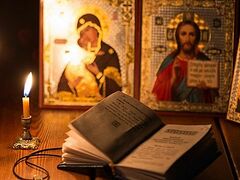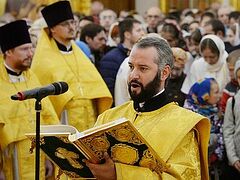Moscow, December 25, 2020
The Moscow Diocesan Assembly held yesterday appreciates the work of the Inter-Council Presence on Worship and Church Art on making the Divine services more understandable for the Russian population.
The decision of the assembly, published on the site of the Russian Orthodox Church, notes that the commission is working on producing a body of texts that will help lay people better understand the services, possibly including parallel Russian translations of the services.
At the same time, the Assembly notes that it is necessary to develop a “measured, ecclesiastical and academically-based approach to replace some incomprehensible words and expressions with more understandable ones, but not impoverishing or distorting the meaning, not violating the style and poetics of Church Slavonic.”
However, His Holiness Patriarch Kirill stressed that the present discussion is not about the complete transition from Church Slavonic to Russian.
At last year’s Diocesan Assembly, Pat. Kirill proposed that Scripture readings be read in Russian in those parishes that desire and would accept it, so that parishioners could better understand the Scriptural images that are used in the services.
“It is absolutely impossible to replace everything with the modern Russian language. We’re not yet used to hearing our conversational language in the context of worship, and perhaps we don’t have to get used to it,” Pat. Kirill said during this year’s Assembly, reports RIA-Novosti.
“But to replace incomprehensible words, to make the text more understandable for an unchurched group of people who are present during the Sacraments—this is our pastoral duty,” the Russian primate stressed. People should leave the Baptism of a family member, for example, having understood something and with a desire to understand more fully what the Church teaches.
In this regard, the Patriarch proposed to identify a group of specialists who could deal with the topic. “It’s better to offer some proven texts than to simply ignore this topic that exists and the practice of spontaneous Russification that actually exists in our Church life.”
According to a survey taken by the All-Russian Center for the Study of Public Opinion in March of this year, 29% of Russian Orthodox parishioners wholly support the partial translation of the services into Russian, and 46% would probably support it. 15% are completely against the idea.
Follow us on Facebook, Twitter, Vkontakte, Telegram, WhatsApp, Parler, MeWe, and Gab!





